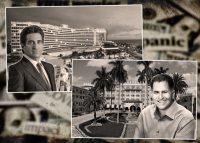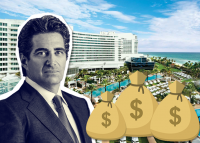Miami-Dade County’s largest resort is no longer in special servicing.
The $975 million commercial mortgage-backed securities loan for Jeffrey Soffer’s Fontainebleau Miami Beach returned to the master servicer on Sept. 23 following successful negotiations with lenders, according to Trepp data updated this week.
The loan was transferred to the special servicer as “a matter of procedure” in April following a modification request, the borrower said at the time. Payments on the loan remained current throughout the special servicing period, so it was never delinquent.
The owners are optimistic about the future. “We’re fortunate to be located in South Florida, which is on the better end of the recovery curve,” Fontainebleau Development President Brett Mufson said. “We expect the season to be a strong one.”
Read more


According to servicer commentary, the forbearance agreement will defer monthly furniture, fixtures and equipment (FF&E) reserve payments to 2021, and exclude the property’s 2020 financials for the purposes of calculating debt yield. Fontainebleau will continue to make regular debt service and escrow payments as before.
FF&E reserves amount to 3.5 percent of gross receipts each month, or about $12 million per year, according to loan documents.
The CMBS debt on the Fontainebleau is quite new. Soffer’s firm secured it as part of a $1.175 billion refinancing from Goldman Sachs, Morgan Stanley and JP Morgan last fall. The 15-acre oceanfront Miami Beach property includes two hotel towers with 846 rooms and two condo towers with 748 units, the majority of which can also be rented to hotel guests at any given time.
At this stage of the pandemic, South Florida’s hotel market appears to be faring much better than most of the country, according to a recent Trepp analysis.
The Miami area’s $4.3 billion in outstanding CMBS hotel debt is the second largest in the country after Las Vegas, but only 8 percent of that is currently delinquent. By contrast, the delinquency rate is 32 percent in New York, 55 percent in Chicago, and 26 percent in Los Angeles. Meanwhile Las Vegas, which entered “phase two” of its reopening as early as May, has a negligible delinquency rate of less than 0.1 percent.
